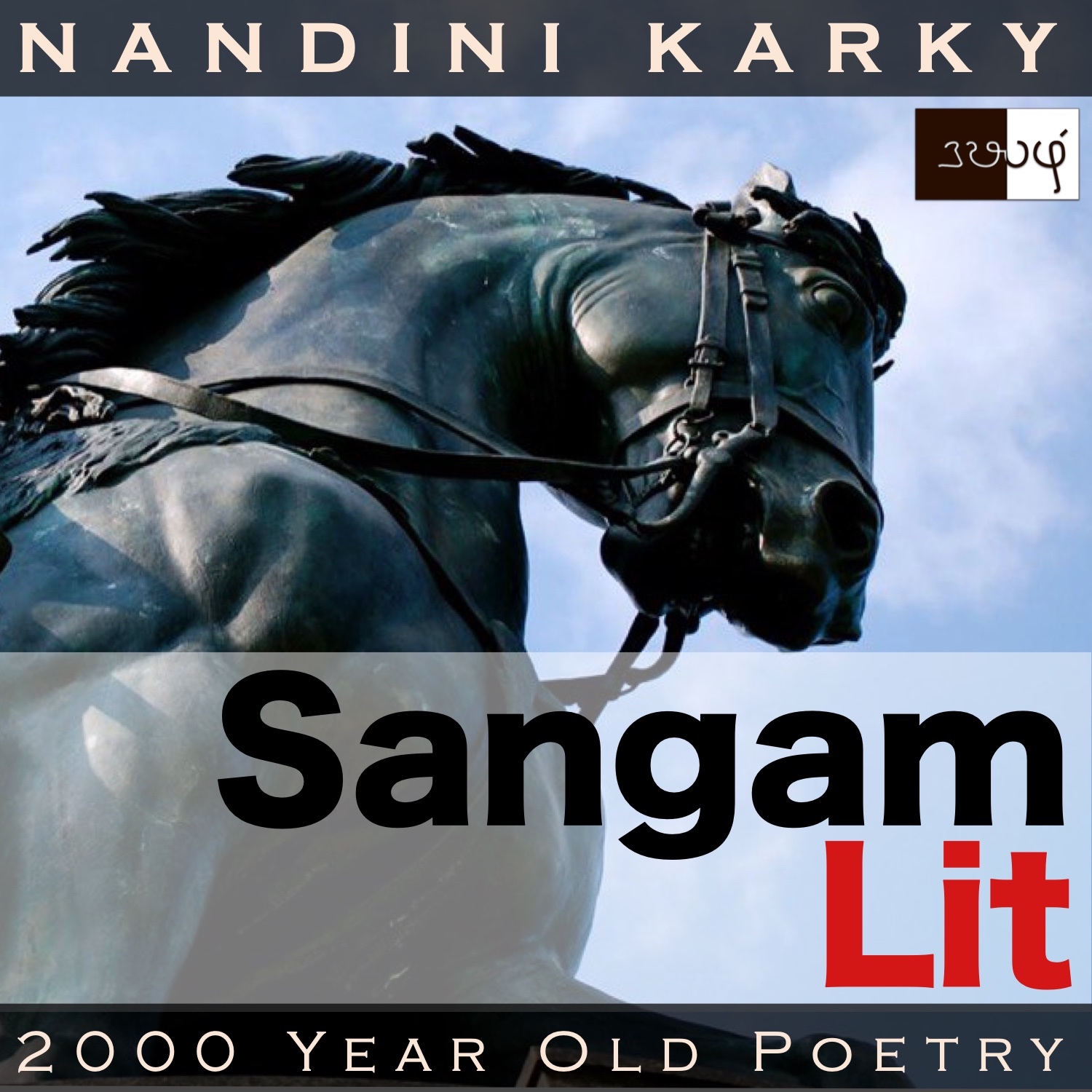Podcast: Play in new window | Download
Subscribe: Apple Podcasts | Spotify | Amazon Music | Android | iHeartRadio | TuneIn | RSS | More

In this episode, we perceive glimpses into history through the glasses of societal reactions, as portrayed in Sangam Literary work, Natrinai 320, penned by Kabilar. The verse is set in the agricultural landscape of ‘Marutham’ and speaks in the voice of a courtesan to her friend, passing on a pointed message to the man, listening nearby.
விழவும் மூழ்த்தன்று; முழவும் தூங்கின்று;
எவன் குறித்தனள்கொல்?” என்றி ஆயின்-
தழை அணிந்து அலமரும் அல்குல், தெருவின்,
இளையோள் இறந்த அனைத்தற்கு, பழ விறல்
ஓரிக் கொன்ற ஒரு பெருந் தெருவில்,
காரி புக்க நேரார் புலம்போல்,
கல்லென்றன்றால், ஊரே; அதற்கொண்டு,
காவல் செறிய மாட்டி, ஆய்தொடி
எழில் மா மேனி மகளிர்
விழுமாந்தனர், தம் கொழுநரைக் காத்தே.
The verse opens with ‘விழவும் மூழ்த்தன்று’ meaning ‘the festival has ended’, giving us a hint about the celebrations that have recently concluded. In a rhythmic style, this is followed by the phrase ‘முழவும் தூங்கின்று’ meaning ‘the drums have quietened’, again letting us hear the storm of drum beats, which since then has fallen calm. Thereafter, we meet with not one, but two famous chiefs in the words ‘பழ விறல் ஓரி’ meaning ‘Ori, of old strength and fame’ and ‘காரி புக்க’ meaning ‘when Kaari entered’. ‘எழில் மா மேனி மகளிர்’ talks about ‘the beautiful and dark skinned women’ of then. Ending with ‘தம் கொழுநரைக் காத்தே’ meaning ‘guarding their husbands’, the verse piques our curiosity!
The man and lady had been leading a married life when the man took to keeping the company of courtesans. During this period, the man leaves a courtesan, favouring another. The first courtesan is angered by this action of the man. One day, when she finds the man listening nearby, the first courtesan turns to her friend and says, “You ask, ‘The festivities have ended and the drum is resting silent. What was she thinking?’ Indeed, that young girl, wearing leaves around, walked in the streets, swaying her waist then. Remember how the victorious chief Ori was killed by Kaari! Akin to how the abode of this Kaari’s enemies resounds, when Kaari enters that spreading street, this town echoed with commotion, when the girl walked by. When they saw the girl, mounting up a guard and closing their doors, beautiful, dark-skinned women, wearing well-crafted bangles, attained acclaim by protecting their husbands!” With these words, the courtesan mocks her rival, in a hidden hope that the man will return to her.
Now, for the details! In most poems from the agricultural landscape, the theme tends to revolve around love-quarrel and courtesans are a prominent feature in the same. As we have discussed, the accumulation of land and property in the hands of a few in an agricultural society is the fundamental reason for these developments. As this was a time when men went to wars or on dangerous missions and often did not return, gender ratios tend to get skewed in such societies. And so, it was considered the duty of men in such agricultural villages to offer wealth and protection to the courtesans although that disrupted their harmonious marital life. In this song, the lady is nowhere in the picture. It turns out to be the man’s love-quarrel not with the lady but with a courtesan. The angry courtesan talks about the other courtesan describing how the girl, young and naive, walked in the streets of the town, after the festivities had ended. This gives us a clue that it was during festivities that courtesans performed dances and sought the company of the village men. There seems to have been an implicit understanding that the courtesans keep to themselves during the other times. But, the courtesan says that young girl seemed to disregard these norms and walked about the streets of the town.
The courtesan sketches the reaction of the townspeople to the young girl near their homes with an intricate historical reference. In Natrinai poems 77, 170 and 291, we have read about Malaiyaman, also known as ‘Kaari’, and his valour in the battlefield. Facets like how kings heaved a sigh of relief when he joined forces with them, how he stole the cattle of his enemies, and about his mighty, black horse which was called ‘Kaari’ too, with which he seemed to be one as he fought against his foes! Likewise, we have met ‘Ori, the king of Kolli hills’ and got to know about his skill in wielding his bow and his wealth and generosity, in other Natrinai poems. This poem marks the clash between these two famous chiefs and how Ori met his end in Kaari’s hands. After Kaari kills Ori, he trots into a street of Ori’s land and his enemies there, shout out with fear and retreat. This image is called in as parallel to the way the womenfolk of the courtesan’s village behaved when that young courtesan walked in their streets.
The embittered courtesan explains further saying these women then made sure to shoo their men inside their homes and lock the doors. She adds a compliment to them too, for their smartness in securing their husbands. With these sharp words, the courtesan intends to convey that the other courtesan took away her man, only because he was under no such protection. Not only does she rebuke the other courtesan saying that girl could find no other man but also seems to subtly hint at how the man was not so precious, as he was easily stolen away by another. In this verse, accentuated with drum beats of envy and anger, we get to glimpse at wars waged in a battlefield and those to make a mind yield!




Share your thoughts...